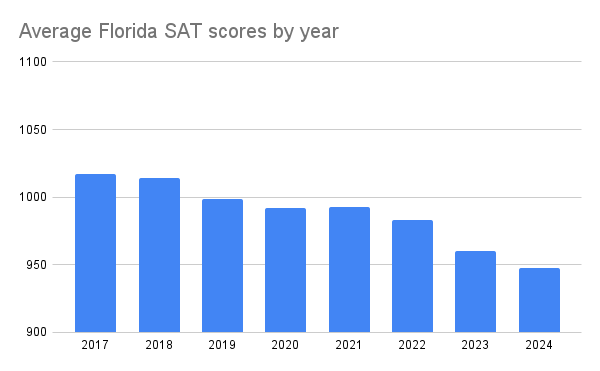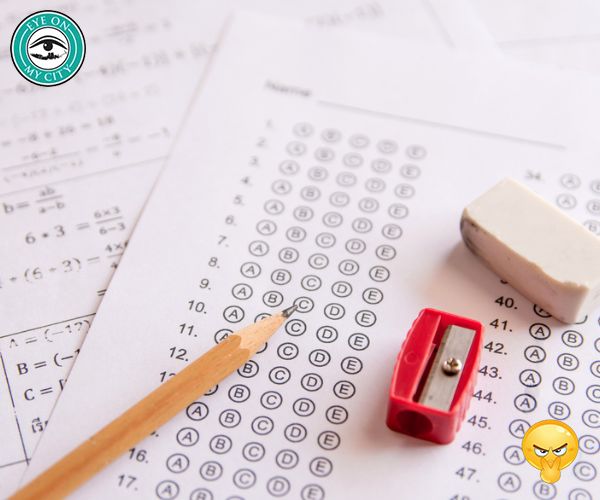
Scores on standardized tests are dropping in Florida, a situation some find startling and complicated to explain.
The American College Testing (ACT) and Scholastic Aptitude Test (SAT) were once required for college admission. Today, many colleges around the country have made them optional for college entry, and legislation passed in Florida in 2023 allows students to use scores on the Classic Learning Test (CLT) to apply to Florida state universities. Students must still score top marks on the SAT, ACT, and the CLT to qualify for the popular Bright Futures scholarship but expanding the options for admissions testing provides students additional opportunities for accomplishing their college goals.
According to an article published in Inside Higher Ed in January of this year, more than 1,900 U.S. colleges and universities no longer require applicants to submit standardized test scores. Additionally somewhere around 80 percent of four-year colleges are either test optional or will not even consider SAT or ACT scores for admission. In 2022-23 only 43 percent of the college applicants submitted SAT or ACT scores, a drop of more than 30 percentage points since before the pandemic.
The SAT is the most popular college admissions exam in Florida and a key test for many students as submitting a college admissions test is required when applying to any of Florida’s 12 state universities.
Recent stories in various publications have focused on the drop in scores for the SAT. Some blame the 2020 pandemic for dropping scores. However, Florida SAT scores have been dropping since 2016. In general, the scores on both the SAT and ACT have been declining since 2017.
For the SAT, the average score in 2023 was 1028, which is the lowest since the test changed formats in 2016. In 2017, the average SAT score was around 1060. As for the ACT, the average composite score has also seen a decline over the past few years. In 2022, the average ACT score was 19.8, compared to 21.0 in 2017.
While these trends have raised concerns among educators and policymakers about the factors contributing to the decline, such as the impact of the COVID-19 pandemic and other educational challenges, Nathalia Medina with the Florida Department of Education says that it is important to keep in mind that the SAT data provided by the College Board in their reports reflects the most recent test taken by each student, rather than their highest score.
“As noted by the College Board, “Relationships between test scores and other background or contextual factors are complex and interdependent,” Medina said. “Caution is warranted when using scores to compare or evaluate teachers, schools, districts, or states, because of differences in participation and test taker populations.”
Additionally, Medina said that in Florida, many students take the SAT to fulfill the assessment requirements for high school graduation. Both the SAT and ACT can be used as an alternative test to fulfill the graduation requirements for students who have not passed the state English and math exams.
Paul Cottle, a physics professor at Florida State University, has a different view on the issue of declining SAT scores. Cottle was quoted in the Orlando Sentinel as saying he was startled by Florida’s lower SAT reading scores this year since reading instruction has been a state focus since former Gov. Jeb Bush’s administration more than 20 years ago.
Florida’s 2024 high school graduates scored an average of 493 on the SAT reading/verbal section, down 10 points from 2023. Florida’s SAT math score dropped eight points to 455, among the lowest for the ten states that, like Florida, test more than 90% of their graduating seniors.
“That just struck me as an enormous change in a single year,” Cottle said. “So not only are we still kind of crappy at math in this state, but our edge in English, reading and writing has started to erode.”
Several factors have been cited as contributing to the decline in both SAT and ACT scores leading with the COVID-19 Pandemic which is blamed for disrupting traditional learning and leading to remote and hybrid learning environments, which affected students’ academic progress and test preparation.
Numerous organizations and agencies including the National Education Association, Fairtest, the Association for Supervision and Curriculum Development, and the Economic Policy Institute have written about the problems with standardized testing. Factors used to try to explain the scores include:
- Educational inequities that emphasize that significant disparities in educational opportunities and resources between students from different socioeconomic backgrounds.
- Mental health and stress have been blamed for increased social and emotional stressors, including anxiety and depression which have impacted students’ ability to focus and perform well on standardized tests.
- Reduced instructional time in many schools is sited as creating challenges in maintaining the quality and quantity of instructional time during the pandemic, which affected students’ learning and readiness for standardized tests.
- Changes in test formats on both the SAT and ACT may have affected students’ familiarity and performance on the tests.
- Expansion of the pool of test takers. For example, the Florida class of 2024 took the SAT in larger numbers than the year before. This could account for the decline in scores. In Florida, 95% of high school graduates, about 230,000 students, took the SAT in 2024. In 2023, 90% of high school graduates, about 205,000 students, took the SAT.
Josh Cowen, a professor of education policy at Michigan State University, told the Orlando Sentinel that he concurred that a larger group of students taking the SAT could be a reason for a drop in scores this year. He also attributed an increase in private school enrollment, driven by the expansion of Florida’s school voucher program, could have played a factor.
Chris Gonzalez, director of the Huntington Learning Center in Jacksonville Beach which specializes on SAT/ACT prep, said the educational environment is changing, and there are several things occurring at the school level that are concerning, and these could be factors in the declining SAT/ACT scores.
“There is a lesser reliance on standardized tests,” he said. “Culture says to hate them, and some schools are giving them less and less. Also, we are seeing teachers testing more and more on a smaller body of work, meaning they may test students on something they have learned over the past week and then move on to a different topic which creates students who memorize work verses learning long term.”
Gonzalez also pointed out that that student demands have become increasingly more complicated. “Students are more involved in extracurricular activities like clubs and athletics, added social demands, and work,” he said. All of this is putting a strain on their ability to devote themselves to academics”
Where math is concerned, Gonzalez says students are taking higher level math courses such as pre-calculus AP Calculus, which is great when applying to college, however, he said for the most part the SAT/ACT tests concepts learned in Algebra II as the highest level.
“We are seeing a large number of students who have forgotten how to do basic math because they are removed from these classes. “We are advising students that take advanced courses not to change their high school path but start taking the SAT/ACT at an earlier grade.”
Despite the criticism of standardized tests many colleges and universities around the country, both public and private, continue require them for admission. In Florida, a dozen public colleges and one private college require either SAT or ACT scores for admission.
The University of Miami, The University of Florida, Florida State University, and the University of Central Florida are all among the top five colleges in Florida with the highest SAT and ACT scores for incoming freshmen.










